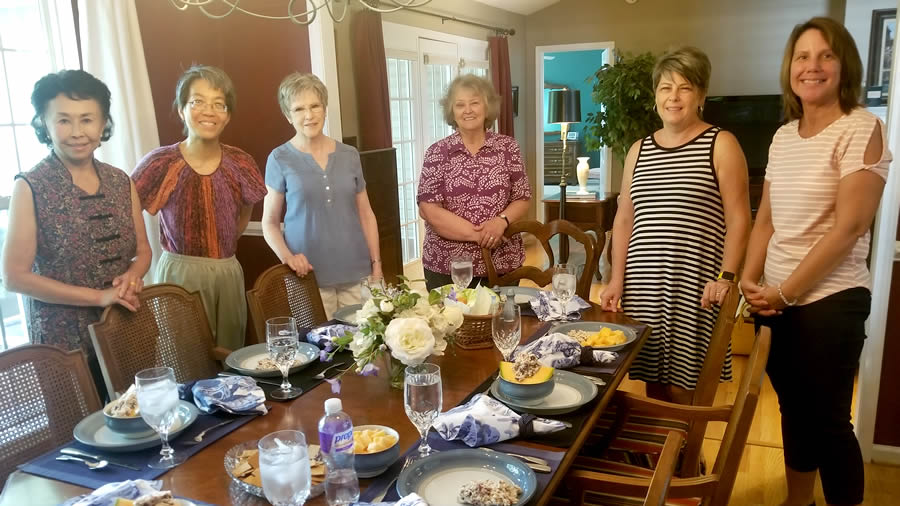The Gospel Comes With a House Key
New book challenges and equips us to reach out and love well.

We all have them. That short stack of books that have profoundly impacted our lives. Changed not only our understanding but the way we live. To my short stack I’m adding Rosaria Butterfield’s The Gospel Comes with a House Key.
I’ve read several books on “hospitality.” But none have reached as deeply into the way I think about and practice hospitality as her discussion of the overflow of table fellowship and caregiving. Rosaria and her husband’s daily schedule radically incorporates preparing extra food, engaging with neighbors, and filling their guest room as a way to make “strangers into neighbors, and neighbors into the family of God.” Rosaria: “This transition … does not happen naturally but only with intent and grit and sacrifice and God’s blessing.”
In today’s culture that is so profoundly fractured by our great divide in beliefs and values, this is God’s way to bridge the divide. And she speaks directly to the saving grace of hospitality in our postmodern culture.
Rosaria’s prophetic call to reach out sacrificially works so deeply precisely because she has woven this call to engagement together with her own story of intentional giving and desperate dependence on God. And the fruit! Difficult family members and neighbors coming to Christ. So many others being comforted and included, encouraged and equipped.

Land-Locked Homes
Many countries are land-locked — no access to the ocean. As a pastor’s wife I can feel like my world is “believer-locked.” We connect with many people, but almost all are people in our church. Last week, for example, we opened our home to a group of church leaders one night to “party and pray,” to a couple for a birthday celebration another night, and to counsel an individual another time.
We also went out to celebrate a birthday dinner for another friend, to encourage another and pray for him on the eve of his major surgery. And I attended a concert with another so she wouldn’t have to go alone. They’re all good things, but pretty much all with leaders in our church family, or part of our small group. Not much intentionality (or bandwidth last week) for strangers. Or even neighbors.
Most weeks are not quite as filled with connection. But I don’t think people see our home as a go-to place to drop by for conversation or encouragement. We’re more “by appointment only.” Except for neighbors who attend our church or live right next door, we don’t really know the others. And, until I read this book, I can’t remember the last time we invited a stranger in.
Even within our church, we are not as intentional as we could be about reaching out to the lonely, the hurting, or those on the fringes. Our guest room has only been used three nights this year for anything besides coats and purses. So many other nights we kicked back with the TV and internet.
That’s What This Book Is About: Radical Ordinary Hospitality
How many people are there like us — who are committed to follow Jesus, but who don’t reach out to people quite like Jesus did? (To lepers. To betrayers like Judas. To little children. To a woman huddled in shame. Day in. Day out.) Too many to count.
Rosaria: “When Jesus walked the earth, he wasn’t afraid to touch hurting people. He drew people in close. He met them empty and left them full.”
She advocates for what she calls “radically ordinary hospitality: … using your Christian home in a daily way that seeks to make strangers neighbors, and neighbors family of God. … When we daily gather with the family of God in organic and open and communal ways and invite those who do not yet know Christ to enter, we accompany one another in suffering. We bear one another’s burdens. We show a watching world what fervent prayer sounds like.”
Discipleship, Outreach, Spiritual Warfare
It’s a massive application of discipleship, outreach and spiritual warfare: “We must work hard to know who our neighbors are and how they struggle. … We gather people in close, we feed and clothe the poor, we accept people where they are, we care for the needs of the body, and we seek to restore the dignity of each human being.”
But it’s very different from the “social gospel”: “We view struggling people as image bearers of a holy God, needing faith in Christ alone … The Christian home is the place where we bring the church to the people as we lock arms together.”
Rosaria proposes treating all others as image-bearers worthy of our love and care as the ultimate solution to the cultural conflicts that are tearing us apart. Showing others why it matters that they are made in God’s image and grounding our male/female, pro-life beliefs in the same love of God. When we live as “despised but hospitable” neighbors, it breaks down walls and makes us a safe person to trust.
Putting the Lonely in Families
Instead of grounding her call to radical hospitality in the biblical texts that specifically talk about it, Rosaria comes to it more indirectly, but powerfully. Discussing her motivation she says, “Kent and I practice daily hospitality as a way of life because we must. We remember what it’s like to be lonely. We remember the contradiction: to be told on the Lord’s Day that you are part of the family of God but then to limp along throughout the rest of the long week like an orphan begging bread.”
“God calls us to practice hospitality as a daily way of life, not as an occasional activity when time and finances allow. Radically ordinary hospitality means this: God promises to put the lonely in families (Psalm 68:6), and he intends to use your house as living proof.”
God so often fulfills his promises through his people. Are we available to help him?
Rosaria puts the same twist on Mark 10:29-30, where Jesus said, “Truly, I say to you, there is no one who has left house or brothers or sisters or mother or father or children or lands, for my sake and for the gospel, who will not receive a hundredfold now in this time, houses and brothers and sisters and mothers and children and lands, with persecutions, and in the age to come eternal life.”
I clung to this verse when Jack and I drove out of Texas to become missionaries in Costa Rica. And again, when we left Texas to take a pastorate here in South Carolina. And God fulfilled his promises both times. But now Rosaria invites us to look at these promises from the perspective of the planted families who partner with God to receive the lonely and to enfold into our homes and our lives those who have left so much to follow Christ. God so often fulfills his promises through his people. Are we available to help him?
What Might Hold Us Back? Addressing Our Motivations
Rosaria challenges us to examine our desires for comfort, perks and even self-centered ambition. Repent of our “failure to love the stranger; our selfishness with our money, our time, and our homes; and our privileged backs turned against widows, orphans, prisoners and refugees.” These strong words might offend readers, but delivered from the context of a life of such extraordinary sacrificial love and grace, they challenged me and invited me in.
Additionally she wrote, “Too many of us are sidelined by fears. We fear that people will hurt us. We fear that people will negatively influence our children. We fear that we do not even understand the language of this new world order, least of all its people. We long for days gone by. Our sentimentality makes us stupid. We need to snap ourselves out of this self-pitying reverie. The best days are ahead. Jesus advances from the front of the line.”

Rosaria Butterfield
It’s quite possible that one of the people that the Butterfields opened their home and hearts to turned around and robbed them. The chapter on the robbery unveils their raw feelings of violation and vulnerability. It also tells the story of how they invited their neighbors and their church family over the Sunday after the robbery not only for comfort, but also their testimony to God’s faithfulness and their determination to continue to reach out to people they cannot always trust.
Modelling With Integrity
The Butterfields model great integrity between their convictions about hospitality and the way they live. They have adopted three children and have been foster parents to many more. They reach out to prisoners and refugees.
Rosaria shares her “hospitality list” which begins with her grocery list and her plans to not just invite people for dinner, but to have an open door. She’s always cooking more than they need in anticipation of last-minute invitations and people dropping by. Her list also includes food for meals she plans to deliver.
She then outlines her weekly schedule. It includes many opportunities for table fellowship and prayer amidst the homeschooling, field trips, visits to prison, dog walks, meal prep, and drop-ins.
One of the most powerful chapters in the book results from Rosaria’s care of her mom as she is dying of cancer. Her mom’s lifelong antipathy and hostility towards the Butterfields’ commitment to Christ melts into gratitude and saving faith.
Another woman, Susanna, stays in her guest room after eye surgery for enough nights to observe the vortex of hospitality with Rosaria at the center. She asks, “Where does all this magic come from?” Pulling no punches, she explains, “from a mom and a dad who put Christ at the center of the home and make the sacrifices necessary to value keeping a home over keeping afloat a two-family career.”
The book concludes with practical tips about how to manage radical ordinary hospitality if you are an introvert (which Rosaria is). It tells how to do it as a husband/wife team (“the slowest runner sets the pace”), and it includes other advice.
Changing My View on Hospitality
While I do not agree with Rosaria’s view of radical hospitality as a daily command (filtered as it is through her theology of the binding nature of Old Testament commands about tithing etc.), there is so much daylight between our pattern of hospitality and hers that I think we have much to learn from her. (Seems like Jesus’s practice of hospitality and caregiving looks a tiny bit more like hers than ours.)

Reading The Gospel Comes with a House Key has begun to deeply change the way I do hospitality. My antennae are more sensitive to opportunities to offer. I invited a group to read her book this summer and included meals or high tea at each meeting (a stretch for me with my RA). But the meals made it so much more fun and intimate. And when the time came for the discussion, the group wanted to remain around the table. I invited a stranger to join us and I’ve so enjoyed getting to know her.
When my friend mentioned she didn’t have anyone to go to the concert with her last week, I enthusiastically volunteered. We had a deep heart-to-heart conversation on the way up to Charlotte and back. (Lest you think this was hardly sacrificial, we dragged back into Columbia at @ 1:00 am) My point is not to say, “Hey look at all I’m doing!” But to tell you how much joy it has added to this past month. So like the Lord Jesus — a deeper call to sacrifice and a richer, more joyful life to the full.
If you want to grow in a lifestyle of following Jesus in hospitality and caregiving, you’ll find an in-depth picture of its contours and details, radiating with sacrificial love and joy, here in Rosaria’s book.
Originally published at LaelArrington.com. Reprinted with permission.



